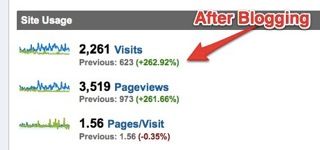This is a guest post by Preston Ehrler.
 As a business owner, do I really have time to blog? I’m a business owner too, and I realize that we are already pressed to our limits for time. We are responsible for everything, including finding new business, working with our existing customers, interfacing with suppliers, running our books, and infinitely more. Attempting to convince a business owner that we should add yet another task can understandably seem like a herculean endeavor. For anything that is going to take more time, the rewards must be tangible and immediate. As many of us cannot clearly identify what the rewards are that can be reaped by blogging, it is not placed high on the list of priorities. It should be.
As a business owner, do I really have time to blog? I’m a business owner too, and I realize that we are already pressed to our limits for time. We are responsible for everything, including finding new business, working with our existing customers, interfacing with suppliers, running our books, and infinitely more. Attempting to convince a business owner that we should add yet another task can understandably seem like a herculean endeavor. For anything that is going to take more time, the rewards must be tangible and immediate. As many of us cannot clearly identify what the rewards are that can be reaped by blogging, it is not placed high on the list of priorities. It should be.
So, you ask, how important could blogging really be for my business?
My answer: Instead of spinning out a list of theories we’ve heard again and again, what if we looked at blogging from a different perspective? Employing a new paradigm by utilizing real data, what can we learn about how blogging, coupled with an effectively constructed website, can affect your company? What, specifically, can we extrapolate? How do we know blogging is worth the effort?
Fact: According to a recent survey by HubSpot, businesses that blog increase their site visits by as much as 55%. My personal experience with my company has been even higher:

Providing your site works hard to convert your visitors (using “Siloing” techniques to push your visitors to the correct interior pages along with quality well-written content, and “Calls to Action” on each page), a single additional visitor can be worth hundreds or thousands of dollars for your business. If you only spend an hour each week blogging and it helps bring in only an additional $20,000 of revenue, your blogging is worth $400 per hour. Interested?
Let’s look at what, exactly, blogging can do for your company.
1. Enhance Your SEO
The most popular question I hear when speaking to a prospective customer is “We want to be number one on Google, how can we do that?” People want it easy and they want it yesterday, and why shouldn’t they? A high organic ranking on Google virtually assures your site more traffic. And while there are certain aspects you can undertake, if you have a small website (under 20 pages), what SEO can do is very limited. Proper title tags, inbound links, and meta information are important, along with keyword placement on your pages. Yet, the most important aspect of SEO for a small site is blogging. Simply by creating a new blog post, you add a page to your website that will be indexed at some point. Therefore, the more posts on your site, the more pages your site becomes, the much greater chance your site has to be identified and ranked accordingly. Although Google’s algorithms are a secret, it is widely believed that there has been a manifest move toward identification of quality content, and away from “junk content.” What does that mean if you blog? It means that Google will notice your posts and will rank you accordingly. Therefore, the very act of blogging, adding great content, and keeping your site “moving” vs. “static,” will enhance your SEO ranking.
2. Interest New Customers
By enhancing your site’s optimization and increasing your site’s number of visitors, you will have the opportunity to convert more visitors to qualified leads and even customers. At the same time, through your blogging, you will be creating quality content that your visitors will appreciate in many ways, some of them very simply. By posting content such as your restaurant’s specials, or your bar’s live music, or items you have on special at your furniture store, you’re enticing new customers to come and visit you. Finally, if you go so far as to give your site the ability to sell certain products or to take advantage of an offer, you are already creating new customers. Let’s say you own a local restaurant that keeps its content moving by posting a weekly blog about your specials. Before blogging, you were averaging about 100 visits per day, and from those visits you booked 5 reservations online per day average. When you started blogging your visits jumped to 150 visits per day, and your conversion rate of 5% remained the same, and you booked 7.5 reservations per day. On average each reservation is for 3 people, and each reservation averaged $40 per person. Therefore on average, that’s $300 more revenue per night, and over a month, that’s $9000, and over the course of a year, that’s $108,000 of top-line revenue. Yes, blogging works for brick and mortar businesses!
3. Engage Existing Customers
Everyone knows new customers are difficult to find, especially in this economic environment. As one of my friends recently said, “it’s a slugfest for new clients out there.” What are you doing to keep your customers interested? How are you creating value for them? One of the most important yet overlooked aspects of blogging is that it allows you to reach out and offer quality-content vs. a static site. A static site, which most sites are, is a site with seldom, or never changing content, offering little reason to return. Quality-content offered through a blog creates an engaged customer base that will return to your site to access that content. Therefore, the act of blogging creates a customer who values your changing content and therefore values you. Through the content, your customer will be much more difficult for one of your competitors to poach by simply under-cutting you on price. Without the content you create by blogging, the perception of your company’s value, over time, can wane, and your product or service will become commoditized, putting you at great risk.
4. Highlight Your Expertise
This past weekend, I had a twenty-minute conversation with two owners of a fireplace shop who possessed an incredible amount of knowledge on their products. As they had been in business for thirty years, there was no question that they had the ability to create a blog on their all aspects of their business. They knew everything, and I was impressed. Everyone, to some degree, is an expert in their field, and blogging allows you to leverage your expertise for the whole world to see. Selflessly imparting the knowledge you have through a blog will quickly begin to highlight you as an expert in your field. The deeper your level of expertise in your niche, the more your blog will be read and passed on, therefore growing your traffic, minimizing bounce and increasing your conversion rate, all of which equates to more business. Even if you just post one high-quality blog, from an expert’s standpoint, per week, over time Google will index those posts and when people search for keywords contained in your posts, up comes your site, and you have an opportunity to convert yet another visitor. Impressive, most impressive.
5. Create Online Revenue
Ultimately, the goal of any business oriented website is to augment revenue. But why then are so many sites not built to easily enable the creation of revenue? Recently, we had the chance to discuss redesigning a website for a prospective customer who sold their product by the pound. They had a very enviable margin (65%) and sold approximately an average of 900 pounds of their product per order at $0.65 per pound. Essentially their website would pay for itself after a handful of orders, yet the key aspect became their concern that existing customers and new customers would not find or embrace their website. The solution offered was to create a blog on their website that would enhance their SEO, interest new customers and engage their existing customers, all while highlighting their expertise—which was significant. Meanwhile, by creating the ability for customers to order their product right from their computer or smartphone, in conjunction with the additional traffic created by blogging, a new revenue stream would be created where one had not previously existed. Giving their customers the ability to place an order 24/7/365 would also enable the company to leverage technology where their competition had not, therefore strengthening their client relationships. How wonderful to have orders flowing to you, without having to ask for them, while simultaneously making ordering quick and seamless for their customers.
Conclusions
Of course, all businesses want to climb the Google ladder up to page one of organic search, and while SEO has become the buzzword for CEOs and presidents, the fastest way for a small company to achieve this is by blogging. While most of us don’t want yet another task to add to our list, when closely examined, blogging is worth the effort. By simply keeping new content flowing onto your website Google, new customers and existing customers will take notice, and engage you at a much higher level—as the expert you are. Additional revenue, the ultimate goal, will undoubtedly follow.
Preston Ehrler started Webvantix to bring professional website design to businesses that need help. The Webvantix blog also discusses ideas for marketing your business online.





Nicely done, Preston! I like the approach of figuring out the hourly dollar value of a blog post.
Thank you Hugo! I think that too many times we fail to “dollarize” the value of our time. Having a clear understanding the ROI for one’s time will naturally lead us to focus on highly effective tasks. Blogging in one of those tasks!
Hi Preston,
Having an ecommerce site and not wanting to make it a static website with no keywords or limited keywords, I have just included a blog onto my website, but I’ve used a different url, because my main email is country based and my blog is a .com. It is posted onto my website, so it will be interesting to see how this affects my traffic. It’s very new and I haven’t got everything polished yet, but I’ve made the effort to get something happening, then I can come back and straigten the little things out. Shortly I will start to promote it to my existing customer base. My company is online based, but it’s still a bricks and mortor business. I really appreciate your comments on this, as I know of many other static business sites, that are boring!!!
20% of our company’s website traffic comes from our blog. I definitely think, blogging is a great value to company. We find it hard to allocate time and resources to preparing good content for our blog. However, I also keep telling people here, that blogs help the business.
Very good insights, Preston. I will use your arguments to present benefits of blogging to our people 🙂
@diane and @lusine Thank you both for the compliments on the post. You are each doing the right thing with blogging for your business and I applaud you for being out in front of the curve for many brick and mortar businesses. My suggestion to keep the posts coming on a regular basis is to solicit ideas from other members of your company, and at the same time focus about 90% of your posts on becoming a resource, and about 10% for promotion–otherwise people will quickly lose interest. Also make sure you offer RSS subscriptions (use Feedburner), and Email subscriptions (I use MailChimp, and Aweber is another popular platform). I hope my post has helped…keep it up!
Thanks, Preston. We use Feedburner, but we do not use email subscrption. Great advice. Yes, I agree about blog being a resource. We need to hold back from trying to promote. Nobody likes that, I don’t either, when I read other posts.
Thanks Preston, I couldn’t agree more about the 90:10% ratio. I have seen some other gift companies promoting their blogs, and it’s just like being on their website, it’s all about their products. I guess though that some people will like this. I am keen to educate people about my community, my city and my country, so that lots of people will want to visit and come and see our beautiful country. I also want to help businesses to get better benefits from social media and why they need to be using it to promote and grow their businesses.